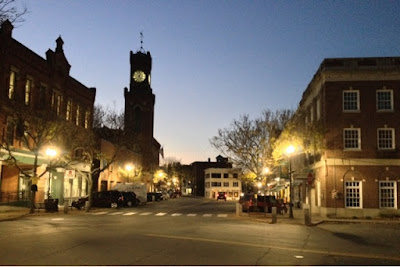We just saw two very good movies (in the Film Festival), very different from each other but related in a way. The first was
Plastic Paradise. The title is ironic. It's really about plastic hell. It's about the trillions of tons of plastic of all kinds that has ended up in the oceans of the world and is destroying them and the life in them. And ultimately us too, because our life depends very much upon the health of the ocean. The central focus of the film was
The great pacific garbage patch - a vast collection of plastic waste created by ocean currents, not unlike what happens when you flush the toilet. It can be as large as the continental U.S., and is mostly underwater. It drifts with the currents, and some of it ends up on islands that interrupt the currents, like Midway Island.
The film graphically portrayed the garbage itself, and even more disturbing, the marine life and birds that get caught in it, or ingest it. Every time we e.g., choose to take a one-time use, plastic bag to take something home from the store, we're encouraging the continued manufacture of those bags, and thus continuing the flow of plastic into the ocean, with resulting death and who knows what long-term effects on life of all kinds. We film-watchers had to watch while a dead albatross' stomach was cut open, there to see an incredible array of plastic, including a bag or two. Please use re-usable cloth bags! There was a panel after the film. Two women from Newburyport, MA, spoke about their successful efforts to get plastic bags banned in their city. A representative of VPIRG (Vermont Public Interest Research Group) spoke about similar efforts in VT, esp. in the legislature. It looks like a state-wide ban of plastic bags is deemed too radical. But we may get a five-cent tax on them that will discourage their use. The MA folks said that the more towns that ban them, the more likely the state legislature would support a ban. The VPIRG guy also mentioned a proposed ban on microbeads. I didn't even know about them. They are plastic microspheres used in cosmetics and even toothpaste! They go through treatment plant filters and into water everywhere. E.g., Lake Erie is heavily polluted with them. IL has banned them, as has CA, but the bans don't go into effect until 2018! Meanwhile . . .
The panel after the film on plastic pollution
The other film was titled All the Time in the World. It was about a family (mom, dad and three kids), who decided to leave their busy, suburban lives for nine months and live in a remote cabin in the Yukon Territory. The film was made by the mom. No film crew. No electricity. No clocks. No devices. Cabin miles and miles from human habitation. Deep cold. They managed to do it! Everybody pitched in. They all worked hard, including the youngest child (5 years old?), played together a lot, read a lot, slept long hours in the depth of winter, spent a lot of time outdoors ( e.g. In getting water everyday and wood for fuel), and were very sad to leave their cabin. It was a lovely film in many ways. Their life was virtually plastic-free. Sure as heck no one-use bags! They were very in touch with the natural world around them. It would be interesting to see a sequel about their life after they returned. Did that experience fundamentally change the way they lived?
One could not see these two films and not turn a very critical eye toward ones own life.









































